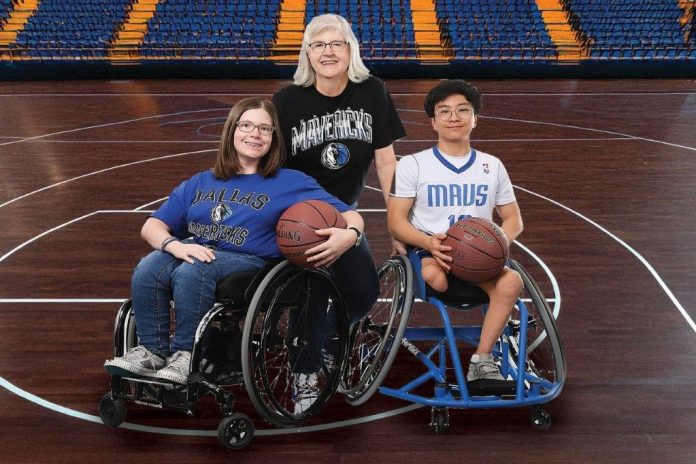Lewisville resident Shannon Anderson smiles from ear to ear whenever she talks about her kids, Kaylee and Keaton.
For instance, get her talking about Kaylee, who is now 29, and she’ll point out that, despite relying on a wheelchair for mobility, Kaylee is one of the most independent young women you’ll ever meet.
She has an apartment in town, is actively involved at church and is rising the ranks as an assistant manager at the Crayola Experience in Plano.
Then there’s Keaton, whom the Andersons adopted internationally when he was little. Keaton is now a busy 8th-grader at Lamar Middle School in Flower Mound and is a starter on his nationally-ranked wheelchair basketball team.
Shannon would love to pat herself on the back for these and many more of her kids’ successes, but that wouldn’t be entirely true.
The real credit belongs to the local adaptive sports community—specifically, the Dallas Jr. Wheelchair Mavericks Basketball program.
“We are blessed in North Texas to have an abundance of adaptive sports opportunities for kids with disabilities,” Shannon said. “Kaylee and Keaton did everything from track and sled hockey to tennis, basketball and other events put on by worthy organizations. But to have something like the Mavs in our backyard has been an honor and a privilege. My kids needed a group and the Mavs gave them that. What hooked me was the amount of self-independence that the program requires.”
“The coaches don’t do things for the kids—they prompt them to do it themselves,” she said. “The expectation is that you’re going to try. As parents, it’s fun to see where our kids are today and how far they’ve come because of that mindset.”
According to numerous online sources, over 100,000 adults and children with physical disabilities and mobility impairments play wheelchair basketball worldwide. This includes recreation and club play as well as college, professional and elite national teams. Wheelchair basketball was also one of the eight original events played at the inaugural Paralympic Games in 1960.
Kaylee was introduced to Dallas Jr. Wheelchair Mavericks Basketball when she was five and continued playing until she reached high school. Keaton has been playing since the third grade. But the Mavs’ competitive and recreational roots date back much further than that.
The organization has served North Texas’ adaptive sports needs since the late 1970s. According to the Mavs’ website, the Variety Wheelchair Arts & Sports Association created the first junior team in 1979.
They offer several programs, including a Futures Team and Prep Team for kids ages five to 13. There are also JV and Varsity squads for kids 14 to 18, though they do accept participants as old as 20.
There are currently 50 kids in the program, and while some are from as close as southern Denton County, others travel from as far away as Midland and the Texas-Louisiana border.
The program aims to offer a wheelchair basketball team for children with physical disabilities otherwise not served by local, community-based programs. Practices are held on Saturdays at the Bachman Recreation Center in Dallas, and for the older athletes, at Trietsch Memorial United Methodist Church in Flower Mound.
Tournaments can involve traveling to San Marcos, Kansas, Atlanta, Wisconsin and more.
“This organization plays an important role in a child’s development,” Anderson added. “Kaylee wasn’t a competitive player when she was there; she used it as her friendship group. She had her church, school and Mavs group, which all did wonders for her. It’s important to know other kids with differences like you who are aspiring and fulfilling their life tasks.”
Mavs coach and Paralympian Darlene Hunter couldn’t agree more. She could have easily given up on life when she suffered a spinal cord injury that changed her life forever.
The year was 1986, and Hunter, just four years old at the time, was paralyzed from the belly button down after being tragically run over by a road grader. While she would never walk again, she refused to let her disability define her.
She started competing in adapted track and field at seven years old. Eventually, she received a track scholarship to the University of Arizona, where she also co-founded the university’s women’s wheelchair basketball team.
In the years that followed, she made it clear that she was more than a casual hoopster.
Fast-forward to today and Hunter is revered as a three-time Paralympian, having won gold with Team USA in 2016 and bronze in 2020.
“There are probably 2,300 kids and adults in the United States who play wheelchair basketball and it’s up to people like me and the legendary people I’m surrounded by to grow awareness for adaptive sports and make them realize their lives aren’t over,” Hunter said. “At the end of the day, we all do better when we have a purpose and are part of a group that accepts us for who we are. We want kids with physical disabilities and mobility impairments to know their lives are valuable and that they can achieve anything. Sure, how they approach the game and life may look different than a non-disabled friend. But nothing is impossible.”
Hunter echoed Anderson’s sentiment that the secret sauce with adaptive sports programs like the Dallas Jr. Wheelchair Mavericks Basketball program is that their goals extend well beyond basketball skills. Participants learn the value of independence, self-esteem, social interaction, physical fitness and self-confidence.
“I took a group of kids to New York, and we flew on an airplane, got on boats, escalators, and the public bus system,” Hunter said. “In one weekend, they navigated all that and learned that they can overcome challenges in life and sports. They can move out of their parents’ houses someday. They can go to school, take trips, work for a living, and get a good education. We want them to have the tools they need to succeed. This is why we do what we do.”
Anderson agreed, adding, “It’s been such a blessing for my kids and our family.”
To learn more about Dallas Jr. Wheelchair Mavericks Basketball and how you can sponsor a child, become a volunteer, enroll a new athlete or keep up with everything going on in the organization, please visit www.dallasjuniorwheelchairmavericks.org.













